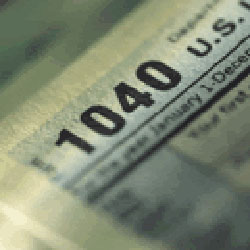 |
 |
 |
 News from Around the Americas | March 2006 News from Around the Americas | March 2006  
Cheating on US Taxes Becomes Bigger Taboo
 Mary Dalrymple - AP Mary Dalrymple - AP


| | 62 percent of people surveyed completely or mostly agreed that "it is everyone's personal responsibility to report anyone who cheats on their taxes." |
Washington — If you knew your neighbors had cheated on their taxes, should you turn them in? More than 3 out of 5 people surveyed by the IRS Oversight Board said you should.

The board, which provides independent oversight and advice for the Internal Revenue Service, found 62 percent of people surveyed completely or mostly agreed that "it is everyone's personal responsibility to report anyone who cheats on their taxes."

That's more than the year before, when a slim majority of 53 percent agreed with that view.

The board didn't delve too much deeper during its interviews with 1,000 people last summer, nor did the board ask a sociologist or psychologist to interpret the results.

Chairman Raymond Wagner Jr. speculated that a spate of financial scandals caused taxpayers to reconnect with their honesty and integrity.

"Taxpayers are mindful of the corporate accounting scandals, the mutual fund scandals, big accounting firms and law firms concocting sophisticated, illegal tax shelters for their big, wealthy clients," Wagner said.

"I think that is calling to people's mind their own sense of playing by the rules and fair play, and paying what they owe under the tax laws," he said.

Scholars who study taxpayers' behavior and honesty agree that stories of corruption could be influencing taxpayer attitudes. They also note that state amnesty programs and state campaigns to stamp out tax shelters may be getting attention.

"It does seem that there's a sense of increased social responsibility that's emerging there," said Steven Sheffrin, dean of the social sciences division at the University of California, Davis.

Sheffrin speculated that the survey may have picked up a "whistleblower type of sentiment," that taxpayers aren't thinking about investigating their neighbors' possible misdeeds but supporting efforts to root out greed and fraud in business and politics.

Jonathan Feinstein, an economics professor at the Yale School of Management, described it as a kind of solidarity taxpayers feel for those who turn in powerful people behaving badly. He called it "some support, moral support, for the kind of whistleblowers who are catching these people."

"Are you going to actually tattle on your neighbor? Most people probably will not," Feinstein said.

Across multiple questions, the IRS Oversight Board survey picked up a slight increase in taxpayers' intolerance for tax cheating. Scholars said some changes might be too small to indicate a true trend.

About 88 percent said it is "not at all" acceptable to cheat on income taxes, slightly more than last year but quite a bit more than the 81 percent who agreed to that statement in 2003.

And 82 percent of taxpayers said their personal integrity has a great deal of influence over whether they report and pay their taxes honestly. The survey had a margin of error of plus or minus 3 percentage points

Sheffrin said his research shows that taxpayer honesty depends heavily on the belief that everyone else pays their fair share truthfully, too.

"The beliefs about your neighbors, about you not being a chump and that people are being honest, has a big influence," he said.

Wagner said one factor could be that taxpayers and professional tax preparers may be responding to IRS efforts to close tax shelters and increase audits.

"It calls to mind an old adage: When they feel the heat they'll see the light," he said.

IRS Oversight Board: http://www.treas.gov/irsob | 
 | |
 |



